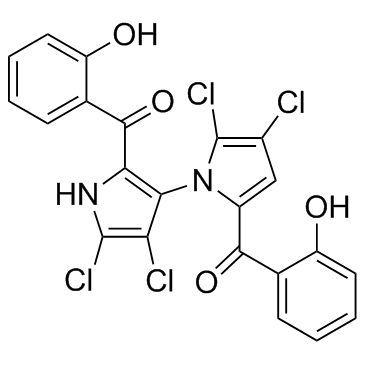1227962-62-0
| Name | Marinopyrrole A |
|---|---|
| Synonyms |
marinopyrrole A
(4,4',5,5'-Tetrachloro-1'H-1,3'-bipyrrole-2,2'-diyl)bis[(2-hydroxyphenyl)methanone] (-)-marinopyrrole A |
| Description | Maritoclax (Marinopyrrole A) is a novel and specific Mcl-1 inhibitor with an IC50 value of 10.1 μM, and shows >8 fold selectivity than BCL-xl (IC50 > 80 μM). |
|---|---|
| Related Catalog | |
| Target |
Mcl-1:10.1 μM (IC50) |
| In Vitro | Maritoclax (Marinopyrrole A) blocks the binding of Bim BH3 α-helix to Mcl-1 but not Bcl-XL. Maritoclax (Marinopyrrole A) markedly inhibits the viability of Mcl-1-IRES-BimEL cells (EC50=1.6 μM) with a selectivity greater than 40-fold over Bcl-2-IRES-BimEL (EC50=65.1 μM) and Bcl-XL-IRES-BimEL (EC50=70.0 μM) cells. Maritoclax (Marinopyrrole A) induces cell death selectively in Mcl-1-dependent but not Bcl-2- or Bcl-XL-dependent leukemia cells. Maritoclax (Marinopyrrole A) induces proteasome-mediated Mcl-1 degradation without induction of Mcl-1 phosphorylation and Noxa expression. Maritoclax (Marinopyrrole A) inhibits Mcl-1 interaction with Bim in intact cells and triggers cytochrome c release from isolated mitochondria. Maritoclax (Marinopyrrole A) synergistically sensitizes lymphoma/leukemia cells to ABT-737[1]. Maritoclax (Marinopyrrole A) shows activity against all tested S. aureus strains, including glycopeptide-intermediate and vancomycin-resistant MRSA, and has potent activities against other Gram-positive organisms. In addition, Maritoclax (Marinopyrrole A) is active against H. influenzae but is inactive against other tested Gram-negative strains. Maritoclax (Marinopyrrole A) displays substantial concentration-dependent killing against MRSA strain TCH1516 and is far more rapid in its antibiotic action than either vancomycin or linezolid. Maritoclax exhibits a favorable therapeutic index, with 50% inhibitory concentrations (IC50) in excess of 20× above the MIC in each case: 32 to 64 μg/mL against HeLa cells and 8 to 32 μg/mL against L929 cells[2]. Maritoclax (Marinopyrrole A) (3 μM) induced-cell death is associated with MCL1 decrease and translation inhibition. Maritoclax (Marinopyrrole A) induces a dephosphorylation of EIF4EBP1 concomitant to a decrease of EIF4E phosphorylation[3]. Maritoclax (Marinopyrrole A) is much more effective against Bcl-2-dependent RS4;11 cells (IC50: 2 μM) when compared to Mcl-1-dependent HeLa cells (IC50: 20 μM)[4]. |
| Cell Assay | Maritoclax (Marinopyrrole A) cytotoxicity is assessed by seeding 2×104 HeLa or L929 cells per well in sterile 96-well tissue culture-treated plates. After 24 h, the medium is replaced with fresh medium containing increasing concentrations of marinopyrrole A, and the plates are incubated at 37°C in 5% CO2 for 24 h. Cytotoxicity is assayed at 24 h by measuring the reduction of MTS [3-(4,5-dimethylthiazol-2-yl)-5-(3-carboxymethoxyphenyl)-2-(4-sulfophenyl)-2H-tetrazolium] using the CellTiter 96 Aqueous nonradioactive cell proliferation assay according to the manufacturer's instructions. |
| References |
| Density | 1.6±0.1 g/cm3 |
|---|---|
| Boiling Point | 732.4±60.0 °C at 760 mmHg |
| Molecular Formula | C22H12Cl4N2O4 |
| Molecular Weight | 510.154 |
| Flash Point | 396.7±32.9 °C |
| Exact Mass | 507.955109 |
| LogP | 6.91 |
| Vapour Pressure | 0.0±2.5 mmHg at 25°C |
| Index of Refraction | 1.708 |
| Storage condition | -20℃ |
